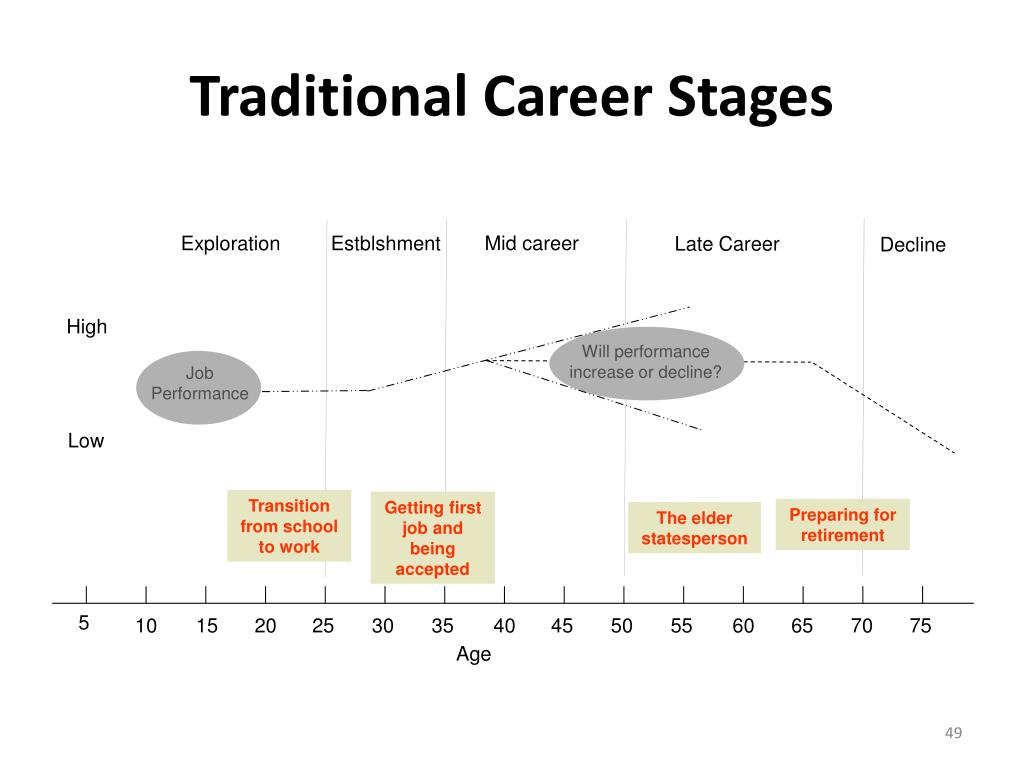Career Planning Stages¶
The progression of an individual's work life can be divided into various stages, each with its unique characteristics, challenges, and opportunities. Understanding these stages can help individuals navigate their careers more effectively and organizations to support their employees better. Here are the typical stages of a career:

1. Exploration Stage:¶
The exploration stage marks the inception of one's professional journey. During this phase, individuals venture into the workforce, often with a blend of enthusiasm, curiosity, and uncertainty.
- Age Range: Typically early 20s to mid-30s, although this can vary based on individual circumstances and educational paths.
- Characteristics:
- Career Sampling: Individuals often try out different jobs, industries, and organizational cultures to discover what aligns with their interests, values, and skills.
- Skill Acquisition: Acquiring a diverse range of skills and competencies is a focal point, as individuals learn the ropes of the professional realm.
- Networking: Establishing professional connections that could pave the way for future opportunities is a common endeavor.
- Feedback Seeking: Individuals frequently seek feedback to understand their strengths and areas for improvement.
2. Establishment Stage:¶
Upon gaining a clearer vision of their career path, individuals transition into the establishment stage, striving to carve out a niche for themselves in their chosen field.
- Age Range: Typically mid-30s to mid-40s.
- Characteristics:
- Career Advancement: Individuals work diligently towards advancing in their careers, whether through promotions, undertaking challenging projects, or assuming leadership roles.
- Reputation Building: Establishing a positive reputation and demonstrating reliability and expertise become paramount.
- Financial Stability: Achieving financial stability and security often becomes a priority.
- Professional Development: Continuous learning and professional development are pursued to enhance job performance and career prospects.
3. Maintenance Stage:¶
The maintenance stage is characterized by a desire to uphold the level of success achieved, while also exploring new avenues of professional fulfillment.
- Age Range: Typically mid-40s to mid-50s.
- Characteristics:
- Career Plateau: Some individuals might experience a career plateau, where the pace of career advancement slows.
- Mentorship: Providing mentorship and guidance to junior colleagues becomes a valued role.
- Skill Refinement: Individuals often focus on refining and updating their skills to remain relevant in their fields.
- Work-Life Balance: Achieving a harmonious work-life balance may become a more pronounced goal.
4. Late-Career Stage:¶
As individuals navigate towards the twilight of their active professional life, the late-career stage unfolds.
- Age Range: Typically mid-50s to retirement.
- Characteristics:
- Legacy Building: Individuals may focus on leaving a lasting legacy within their organization or profession.
- Succession Planning: Transitioning responsibilities and knowledge to younger colleagues becomes crucial.
- Consultancy Roles: Some individuals transition into consultancy or advisory roles, leveraging their extensive experience.
5. Transition/Retirement Stage:¶
The transition to retirement heralds a significant life change as individuals step back from active professional engagement.
- Age Range: Retirement age and beyond.
- Characteristics:
- Retirement Planning: Individuals focus on financial planning, lifestyle changes, and preparation for retirement.
- Engagement in New Activities: Many explore new activities, hobbies, or volunteer work that provides personal fulfillment and engagement.
- Reflection: Reflecting on career achievements, life experiences, and future aspirations is a common aspect of this stage.
The delineation of career stages serves as a guiding framework, aiding individuals and organizations in understanding the myriad facets of career development and planning. Each stage, with its unique characteristics and focal points, contributes to the rich tapestry of an individual's professional narrative.